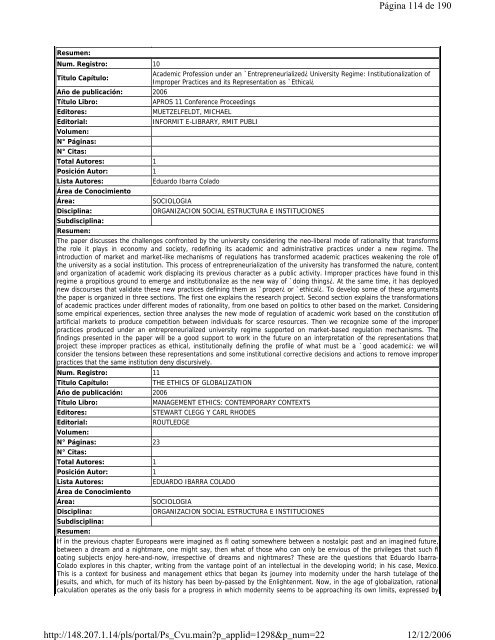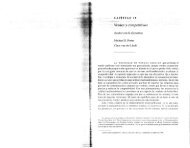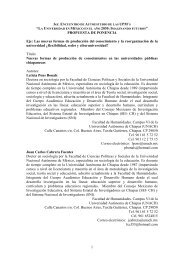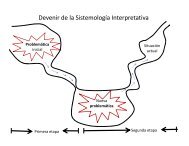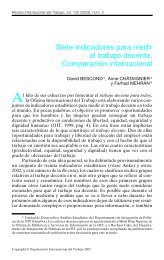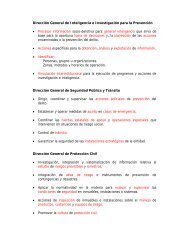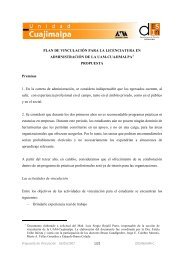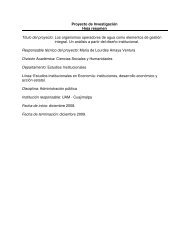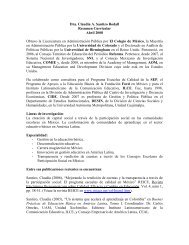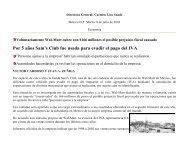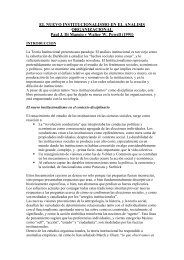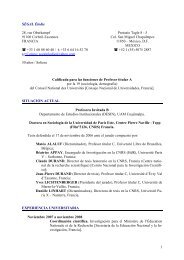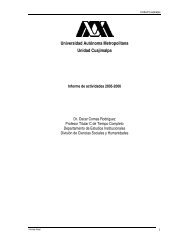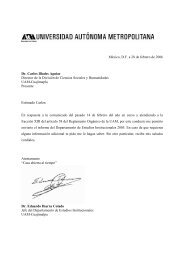INFORME ANUAL DE ACTIVIDADES Enero-diciembre ... - laisum
INFORME ANUAL DE ACTIVIDADES Enero-diciembre ... - laisum
INFORME ANUAL DE ACTIVIDADES Enero-diciembre ... - laisum
Create successful ePaper yourself
Turn your PDF publications into a flip-book with our unique Google optimized e-Paper software.
Resumen:<br />
Num. Registro: 10<br />
Página 114 de 190<br />
Academic Profession under an `Entrepreneurialized¿ University Regime: Institutionalization of<br />
Titulo Capítulo:<br />
Improper Practices and its Representation as `Ethical¿<br />
Año de publicación: 2006<br />
Título Libro: APROS 11 Conference Proceedings<br />
Editores: MUETZELFELDT, MICHAEL<br />
Editorial: INFORMIT E-LIBRARY, RMIT PUBLI<br />
Volumen:<br />
N° Páginas:<br />
N° Citas:<br />
Total Autores: 1<br />
Posición Autor: 1<br />
Lista Autores: Eduardo Ibarra Colado<br />
Área de Conocimiento<br />
Área: SOCIOLOGIA<br />
Disciplina: ORGANIZACION SOCIAL ESTRUCTURA E INSTITUCIONES<br />
Subdisciplina:<br />
Resumen:<br />
The paper discusses the challenges confronted by the university considering the neo-liberal mode of rationality that transforms<br />
the role it plays in economy and society, redefining its academic and administrative practices under a new regime. The<br />
introduction of market and market-like mechanisms of regulations has transformed academic practices weakening the role of<br />
the university as a social institution. This process of entrepreneurialization of the university has transformed the nature, content<br />
and organization of academic work displacing its previous character as a public activity. Improper practices have found in this<br />
regime a propitious ground to emerge and institutionalize as the new way of `doing things¿. At the same time, it has deployed<br />
new discourses that validate these new practices defining them as `proper¿ or `ethical¿. To develop some of these arguments<br />
the paper is organized in three sections. The first one explains the research project. Second section explains the transformations<br />
of academic practices under different modes of rationality, from one based on politics to other based on the market. Considering<br />
some empirical experiences, section three analyses the new mode of regulation of academic work based on the constitution of<br />
artificial markets to produce competition between individuals for scarce resources. Then we recognize some of the improper<br />
practices produced under an entrepreneurialized university regime supported on market-based regulation mechanisms. The<br />
findings presented in the paper will be a good support to work in the future on an interpretation of the representations that<br />
project these improper practices as ethical, institutionally defining the profile of what must be a `good academic¿: we will<br />
consider the tensions between these representations and some institutional corrective decisions and actions to remove improper<br />
practices that the same institution deny discursively.<br />
Num. Registro: 11<br />
Titulo Capítulo: THE ETHICS OF GLOBALIZATION<br />
Año de publicación: 2006<br />
Título Libro: MANAGEMENT ETHICS: CONTEMPORARY CONTEXTS<br />
Editores: STEWART CLEGG Y CARL RHO<strong>DE</strong>S<br />
Editorial: ROUTLEDGE<br />
Volumen:<br />
N° Páginas: 23<br />
N° Citas:<br />
Total Autores: 1<br />
Posición Autor: 1<br />
Lista Autores: EDUARDO IBARRA COLADO<br />
Área de Conocimiento<br />
Área: SOCIOLOGIA<br />
Disciplina: ORGANIZACION SOCIAL ESTRUCTURA E INSTITUCIONES<br />
Subdisciplina:<br />
Resumen:<br />
If in the previous chapter Europeans were imagined as fl oating somewhere between a nostalgic past and an imagined future,<br />
between a dream and a nightmare, one might say, then what of those who can only be envious of the privileges that such fl<br />
oating subjects enjoy here-and-now, irrespective of dreams and nightmares? These are the questions that Eduardo Ibarra-<br />
Colado explores in this chapter, writing from the vantage point of an intellectual in the developing world; in his case, Mexico.<br />
This is a context for business and management ethics that began its journey into modernity under the harsh tutelage of the<br />
Jesuits, and which, for much of its history has been by-passed by the Enlightenment. Now, in the age of globalization, rational<br />
calculation operates as the only basis for a progress in which modernity seems to be approaching its own limits, expressed by<br />
http://148.207.1.14/pls/portal/Ps_Cvu.main?p_applid=1298&p_num=22<br />
12/12/2006


